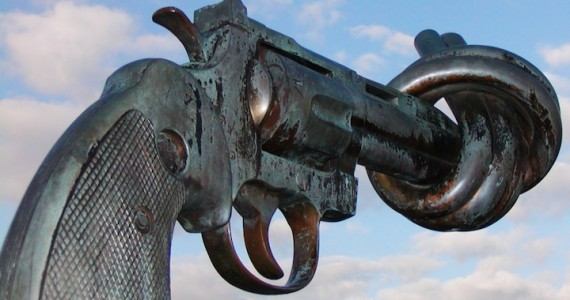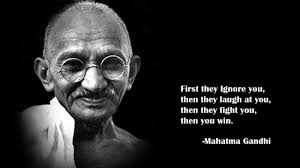When faced with the question of how to deal with violence, most people think there are only two options: either be violent in return, OR lay down and die as a pacifist. There is, however, a third way, which is called “Non-Violent Resistance.” It is what was practiced by Gandhi and Martin Luther King, Jr., and so many other people throughout history. It is also the way of Jesus.

I have been doing a lot of reading and thinking about this over the past six years or so, and some of what I have learned will find its way into my upcoming book about giving up our rights, but here is a post about non-violent resistance, and some of the principles involved for living this way.
Though I do not have the time or space in the conclusion to this chapter to fully explain non-violent resistance, let me present a few of the guiding principles of this practice, and also suggest a few books so you can do further reading and research on your own.
1. Non-Violent Resistance Takes Courage
The first principle of non-violence is that it is only for courageous people who are willing to embrace it 100%. As long as there is the possibility in your heart of engaging in violence toward others, non-violence is not recommended. It takes great spiritual, mental, and emotional strength to engage in non-violent resistance, and must not be entered into lightly.
2. Non-Violent Resistance Seeks Friendship with Enemies
This leads to the second principle of non-violent resistance: Non-violence seeks to win friendship and understanding from enemies. It does not seek to shame or humiliate enemies, but to redeem and reconcile them to us, and to each other.
3. Non-Violent Resistance is about Defeating Injustice
 This is important because of the third principle of non-violent resistance, which is that we are not seeking to defeat people but to defeat injustice. Non-violence recognizes that those who perpetrate violence are victims of violence as well.
This is important because of the third principle of non-violent resistance, which is that we are not seeking to defeat people but to defeat injustice. Non-violence recognizes that those who perpetrate violence are victims of violence as well.
4. Non-Violent Resistance believes that Suffering Can Educate
Fourth, non-violence holds that suffering can educate and transform individuals and societies if those who engage in non-violent resistance accept violence toward them without retaliating violently toward others. Countless examples throughout history reveal that unearned suffering is redemptive and has tremendous educational and transformative possibilities.
5. Non-Violent Resistance Chooses Love over Hate
Fifth, non-violent resistance always chooses love instead of hate. Since love is unmotivated, unselfish, creative, and always seeks the good of others, those who practice non-violence will return good for evil and forgiveness for hate.
6. Non-Violent Resistance Recognizes that God is on the Side of All
Finally, those who practice non-violent resistance recognize that despite the rhetoric of war, God is on the side of justice, not just for one party or another, but for all. Though it may take time, justice will always win.
If you want to learn more about non-violent resistance, what it is, and how to practice it as a follower of Jesus, I recommend these books:
- “The Powers Trilogy” by Walter Wink
- Fight by Justin Sprinkle
- A Faith Not Worth Fighting For edited by York Tripp and Justin Barringer
- Stride Toward Freedom Dr. Martin Luther King, Jr.
What are your thoughts on non-violent resistance? Have you heard of it? Does it “work”? Does it even matter if it “works”? Do you think you have the courage to resist evil and violence in this way (I do not think I do)?




Of all these points, #6 is the one that strikes me the most, and possibly worthy of some more discussion. Nevermind just the rhetoric of war, I think there is a common refrain amongst modern evangelicals that “God is on our side, so who can stand against us?” I’ve often found this notion to be troubling, in a way I can’t quite put my finger on.
Ok so God cannot be defeated, but do we know the battle God is fighting? And HE is on OUR side? Surely the best we could hope for is that we are on his side. But then when we consider Jesus and the way of peace, I’m not even sure that we could confidently say that.
So your point carries this home really well. God is on the side of all. Our battle is not against flesh and blood, but against the principalities and powers. It is not “WHO can stand against us”, but “WHAT can stand against us”. And what is God fighting against? Perhaps in our day and culture it’s things like injustice, corruption, individualism, hoarding and a lack of generosity… the list may be long but amongst these things there are no faces.
Thanks, Mike. There is so much here that needs discussion and exploration. I am relatively new to this idea, and am slowing finding others who think similarly. I struggle with how to live out these concepts practically in our time and culture…
It worked for MLK here in the USA and of course with Ghandi it was effective with Great Britain- both democracies with Judeo Christian societies and Government documents which extolled a Judeo Christian principle or principles of governance. Both countries were ripe for reformation based upon their founding documents. Like most things in life iron clad principles of action for human beings are hard to make due to the inherent uniqueness of each circumstance. As a believer it certainly behooves us in individual encounters where we are willing to sacrifice ourselves wholly for the other to do so if following the example of Jesus. However if I have a weapon and an ISIS fighter-butcher-terrorist has a gun or knife to an innocent it behooves me to take him out by whatever means. NVR is great under the right circumstances yet isn’t always feasible. I debated pacifists in my youth at a youth conference and the thing that became so prominent in my mind was the willingness to be consistent or inconsistent in the principle- I remember a professor telling me he would be willing to sacrifice his wife and child to avoid a violent encounter and while I lauded him for his consistency I abhorred his morality. I know pacifism isn’t the issue pre se here but I find many principles of either pacifism or NVR are giving with examples that seem to fit that particular belief and men are lauded who successfully utilized it- but rarely are those circumstances repeated. Sorry for the long winded response.
Your points are well made, but I’m curious how you would reconcile a willingness to kill with God’s command not to kill or Jesus’ command to love our enemies. If you are placing exceptions on these principles, how far do they go? What if the man who has the gun or knife to an innocent was your son? Would it still behoove you to take him out by whatever means?
Why would it be immoral to be willing to sacrifice a loved one to avoid killing a perpetrator? It is shocking and confusing; it could be viewed as cowardice or negligence — but immoral? The implication is that it’s immoral to consider the life of a perpetrator equal to the life of a loved one.
Mark,
Yes, I believe I might respond similarly in the face of an ISIS threat. But based on my understanding of non-violent resistance, I am not sure that this is how Gandhi or Martin Luther King would have responded … or Jesus for that matter. But then, is the proper response to just let the terrorist do whatever he wants? I cannot imagine that either….
why do you distort christ more and more?
Me? I am not sure what you are saying here.
Why do you endorse homosexuality?It’s death
It ain’t non-violent resistance ,it’s love
As someone who has been involved in advocacy, I can say this is food for thought. How challenging it is to even want to pray for one’s enemies rather than strike a win for justice in the battle of the moment. And it is harder to want to pray than actually pray: the former speaks to heart attitude, the latter to just doing it.
I can’t wait for your book on this topic.
Well, most of the book is not on this topic. In fact, when it comes to non-violent resistance, most of what is in the book on this subject is written above in this post…
As Mark stated above, there is no clear principle that can be applied to every situation. I will not allow someone to kill a loved one to prove the point of pacifism. I will not allow myself to be herded to my death without a fight in the face of an enemy as many did in Nazi Germany.
There was an interesting movie that dealt with this topic released in 1986 called “The Mission”. Robert Deniro plays a violent conquistador who is trying to repent of past sins and work out his salvation as led by Jeremy Irons who plays the Priest. I won’t spoil the ending if you want to watch it…thought provoking though…
http://stream.moviehdplay.com/play.php?movie=0091530
https://www.youtube.com/watch?v=Y-l2-Q7vODc
Very engaging conversation with twists and turn that are not smoothly navigable.
Pacifism should not be absolute, otherwise one should not duck a bullet fired by an unprovoked aggressor, one should not ward off a punch one sees coming.
The person who said he could sacrifice his family to be pacifist could well be wanting in courage and unable to provide for his family. I would credit him with courage if he would not kill a fly that threatens his eyes, or sacrifice hinself.
As Christians we should pray not to be led into temptation. But where the circumstances allow, we reserve a right to defend ourselves, and let God judge the rest.
I am not a pacifist. I do hope that God gives me creativity and wisdom in violent situations to find a non-violent way to resolve them… I think we too often resort to violence.
But like you, I will defend my family with violence if I can find no other way to protect them.